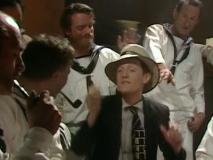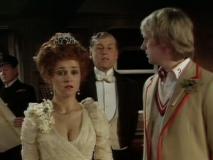An Unearthly Series - The Origins of a TV Legend
Saturday, 16 November 2013 - Reported by Marcus

 The twenty-ninth in our series of features telling the story of the creation of Doctor Who, and the people who made it happen.
The twenty-ninth in our series of features telling the story of the creation of Doctor Who, and the people who made it happen.By the middle of November, the show's opening serial had been recorded, and production was proceeding on the second - The Daleks, by Terry Nation.
On Saturday 16th November 1963, exactly fifty years ago today, the British public had their first glimpse of Doctor Who, when the first trailer for the new series was broadcast on BBC Television.
The trailer was shown at 5.40pm, sandwiched between an episode of the cartoon series Deputy Dawg, in which he tries to sell his vintage fire engine, and an episode of The Telegoons, the puppet show version of the radio's The Goon Show. The Doctor Who trailer no longer exists, but the script survives in the BBC archives.
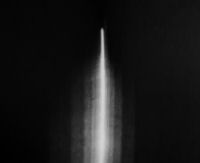
It begins with a clip of the opening sequence.
The voiceover from the series' lead actor.
My name is William Hartnell and, as Doctor Who, I make my debut on Saturday the 23rd November at 5.15.The voiceover from the series' lead actor.
The Doctor is an extraordinary old man from another world who owns a time and space machine.
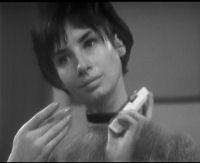
The trail then showed a shot of Susan, dancing to the music of John Smith and the Common Men.
He and his grand-daughter, Susan, played by Carole Ann Ford, have landed in England and are enjoying their stay, until Susan arouses the curiosity of two of her school-teachers… 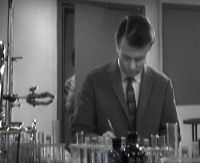
Shot of Ian Chesterton in his classroom.
…played by William Russell… 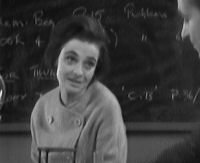
Shot of Barbara Wright standing in front of a blackboard.
…and Jacqueline Hill. 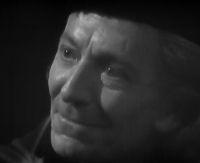
Shot of the Doctor.
They follow Susan and get inside the ship and Doctor Who decides to leave Earth… 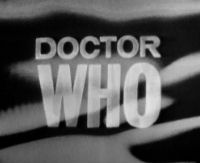
Shot of the series title card.
…starting a series of adventures which I know will thrill and excite you every week. (Announcer) Doctor Who begins on BBC Television this Saturday at 5.15.
It is absolutely essential that the fact that the spaceship, from the exterior, looks like a police telephone box, should remain completely confidential.
Although thirteen episodes were now confirmed and a transmission date was fast approaching, the production team were still having to cope with a number of problems and an inherent resistance to the show from within the BBC. James Mudie, the Head of Scenic Servicing for Television, had been against the idea from the start, worried that late scripts and impossible demands would put undue pressure on his department and jeopardise other productions. In July, he had warned the management to "think twice about proceeding with a weekly series of this nature." Things came to a head in early November when the Controller of Programme Services, Ian Atkins, decided that the spaceship set was too heavy and cumbersome and needed to be simplified. It was taking too long to be rigged in the studio whenever it was needed, and would have to be redesigned. Mudie jumped on this memo and asked Head of Design J Beynon-Lewis and the designer of the current story in production, Raymond Cusick, to proceed with this as a matter of urgency: "in its present form it is obstructing the night setting operations for the whole of the Television Service."
Cusick informed Lambert of the instructions for the redesign he had been given. Although she had no strong objection, she was adamant that the costs for the redesign should not come from Doctor Who's budget but should be paid for by the design department, as the fault lay with original designer Peter Brachacki. Lambert was not happy that she had been bypassed in the decision process and not included in the memo to Cusick. She complained to her superior, Wilson: "No copy of Mr Mudie's memo was sent to me and instructions were issued to the designer without reference to me, in spite of the fact that no provision of man hours or money has been made for this by anybody up to the present time."
On Friday 15th November the first episode of The Dead Planet was recorded at Lime Grove Studio D, although the following week it would be discovered that the episode was not quite as ready for transmission as had been thought . . .
Throughout the problems, one man remained buoyant, fully behind the series and its untried production team. On Friday 15th November Head of Television Drama Sydney Newman sent Wilson the following memo.
From: Sydney Newman. Head of Television Drama.
To: Donald Wilson. Head of Script Department, Television Drama.
Date: 15 November 1963
STRICTLY CONFIDENTIAL
I talked to Donald Baverstock this morning about Dr. Who and am happy to tell you he is very keen about what he has heard about the serial.
He is worried about money and was unable to commit himself at this time to the continuation of the serial beyond thirteen. I would suggest that some time next week you give him a ring and . . . go and see him for a decision. If you handle him right I am sure everything will be OK.
To: Donald Wilson. Head of Script Department, Television Drama.
Date: 15 November 1963
STRICTLY CONFIDENTIAL
I talked to Donald Baverstock this morning about Dr. Who and am happy to tell you he is very keen about what he has heard about the serial.
He is worried about money and was unable to commit himself at this time to the continuation of the serial beyond thirteen. I would suggest that some time next week you give him a ring and . . . go and see him for a decision. If you handle him right I am sure everything will be OK.


SOURCES: The Handbook: The First Doctor – The William Hartnell Years: 1963-1966, David J Howe, Mark Stammers, Stephen James Walker (Doctor Who Books, 1994); Radio Times: Vol: 161 No 2088; The Destruction of Time

